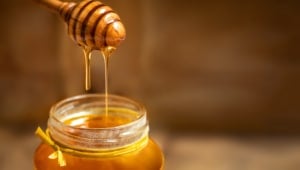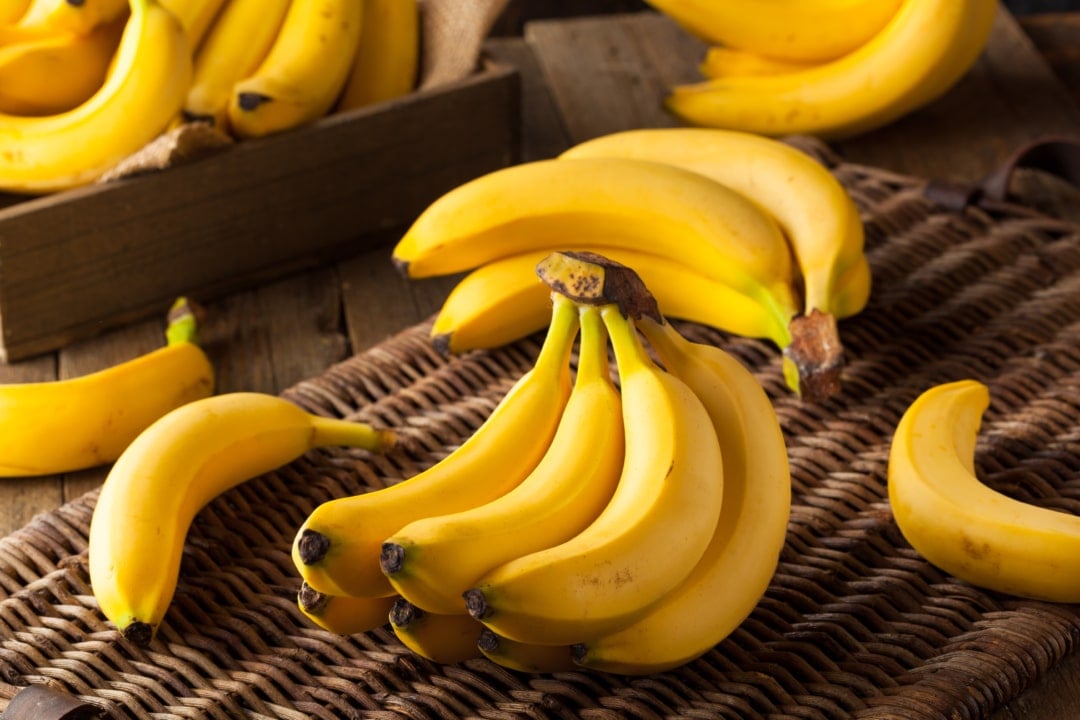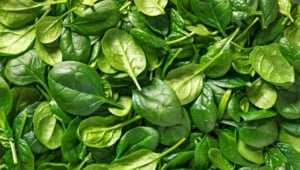5 Health Benefits of Honey + 3 Tips and Hacks

Honey, nature’s liquid gold, boasting antibacterial properties and the ability to heal wounds, has been a staple in our kitchens and medicine cabinets for centuries. Brace yourself for some exciting facts, handy tips and hacks, and the extraordinary tale of honey’s origin.
This sweet treat, filled with vitamins and minerals, helps fight oxidative stress and is chock-full of antioxidative and anti-inflammatory properties that boost our health. But the wonders of honey spread far beyond its sweet taste and health perks.
Interesting Facts about Honey

Interesting Facts about Honey
Believe it or not: the properties of honey depend on the flowers loved by the bees. Just like grapes for wine, the terroir (or where the nectar is sourced) can dramatically vary the taste, health perks, and color of this sweet elixir. And there’s more to unravel about this buzz-worthy product.
Origin of Honey

Origin of Honey
The oldest honey discovered, tucked away in Georgia, has been dated back some 5,500 years. Now, how’s that for a timeless piece?
The art of apiculture, that’s fancy talk for beekeeping, is believed to have emerged in Egypt around 4,500 years ago. Ancient Egyptians were smooth operators you see, they recognized the healing powers of honey. They used it to clean wounds and prevent infections.
Cleopatra herself was known to bathe in the stuff to keep her skin youthful. Imagine that, walking around smelling like a living honey pot. But hey, if it’s good enough for the Queen of the Nile, it’s good enough for you and me.
Besides the Egyptians, other cultures have incorporated honey into their traditional medicines. Ayurveda, a healing tradition in India, hails honey as an essential ingredient in many of its remedies.
Over in Greece, Hippocrates, the father of medicine, didn’t skimp on honey either. He preached about its health benefits, prescribing it for all sorts of ailments from eye diseases to throats burnt out from belting out their favorite tunes. Or, you know, from bacterial infections or what have you.
So, from ancient golden tombs in Egypt to the halls of Greek healers, honey’s health-enhancing history just goes to show that all that glitters might just actually be gold.
Especially if it’s that gooey, golden goodness called honey. People throughout history seem to have grasped honey’s contributions to health and wellness. And with this sweet history lesson out of the way, it’s about time we did too.
Ancient Use of Honey

Ancient Use of Honey
Now, talking about blowing one’s mind, did y’all know that honey isn’t something we stumbled upon recently?
Ancient civilizations, like the Egyptians, used honey in more ways than you could swirl honey in your morning tea.
The Egyptians, bless their heart, were real innovators. They used honey for embalming their dead. You read that right – they were encapsulating their dearly departed in the sweetness of honey. Isn’t that something?
They also mixed honey with bits of plants to make what we’d now call facial masks. Further out east, we got the Chinese. Seems they not only invented paper and gunpowder, but they also figured out before anyone else that honey is a great natural medicine.
They used it to fight off infections and heal wounds, you see. They mixed it into their healing brews and concoctions, setting a pattern that would be followed for millennia.
Those ancient Greeks weren’t lagging either. Their philosophers, like Aristotle and Democritus, raved about honey, likening its benefits to the drink of the gods – probably the highest compliment in ancient Greece.
Types of Honey

Types of Honey
You won’t believe the number of honey types buzzing around out there, folks. The world of honey is as diverse as the colorful flowers bees feast on.
To keep things sweet and simple, we’ll stick to four main types: Wildflower, Clover, Manuka, and Buckwheat.
Wildflower honey, true to its name, originates from a myriad of flowers and plants. It’s like a floral cocktail – no two batches taste the same, each with its own unique flavor and color palette.
A touch whimsical and wonderfully unpredictable, this type of honey reflects the fine art of these industrious little worker bees.
Next up, meet Clover honey. Made mainly from clover nectar, it’s the trusty classic in the mix, known for its light color and mild, pleasing sweetness.
Then we’ve got this unique little thing called Manuka honey, straight from New Zealand’s Manuka bushes. It’s the heavyweight champ in the honey world, with natural antibacterial qualities to boot.
Pricey? Yes. Worth every penny? You bet. Rounding off the list is Buckwheat honey. It’s got a bold personality with a distinctive deep color and strong flavor. Some folks might compare it to black coffee – it’s an acquired taste, but once you get a hang of it, you wouldn’t want it any other way.
To sum up, the sweet stuff, remember that each honey’s flavor, color, and even health kick depend on the particular flowers pollinated by those busy little bees.
What Manuka Honey Is

What Manuka Honey Is
Let’s talk about Manuka honey, also known as the king of honey. Ever wonder why it’s held in such high regard? Well, imagine a honey bee taking a stroll through the Manuka bush in New Zealand.
The nectar it gathers is as rare as a home run in a pickleball game. While honey bees produce many varieties of honey, this specific kind is what they make from the Manuka bush.
So what makes Manuka honey so special? Picture the average honey hiding grains of goodness as if it were a vegetable garden. Now, imagine Manuka honey as a lush, abundant farm.
That’s the difference. In short, Manuka honey is like a knight in shining armor against harmful bacteria. This bounty of benefits is due to a worthy substance it holds unto itself, a certain methylglyoxal (MGO).
While all types of honey contain some amount of hydrogen peroxide providing antibacterial action, Manuka has MGO, a compound with off-the-charts antibacterial properties.
When you hear Manuka honey, think of nature’s own first aid kit. Additionally, its throne in the kitchen, and its rich, thick, and caramel-like essence can elevate any culinary affair from mundane to royal. A drizzle of Manuka on your yogurt, toast, or tea, and you might never look back to your average honey again.
However, be aware that not all honey labeled as Manuka is genuine. Remember this: the higher the MGO, the stronger the antibacterial benefits. The Unique Manuka Factor (UMF), a grading system assessing purity and quality, will guide you through.
Ensure any Manuka honey you purchase sports a UMF certification label. Keep in mind that a UMF value over 10 indicates high quality, while 20 or higher is a superior grade.
Nutritional Facts and Calories of Honey

Nutritional Facts and Calories of Honey
Hey, let’s jump straight into this piping-hot cup of sweet facts about honey, shall we?
Well, when you gather around for your evening tea and ponder over that golden, gooey, vastly sticky stuff known as honey, you’re essentially holding a nutrition powerhouse just waiting to be discovered.
And believe us, the nutritional values enclosed in a mere tablespoon of this liquid gold are quite a revelation.
Honey and Its Nutritional Constituents

Honey and Its Nutritional Constituents
Breaking down honey isn’t like figuring out a Rubik’s Cube, but you’ll be surprised about its constituents. This syrupy delight, mostly made up of carbohydrates (95 to 97 percent of its dry weight to be precise), isn’t just about sugars.
No, it’s also packed with a punch of proteins, vitamins, amino acids, minerals, and organic acids. Quite a mouthful, yes?
Now, among the vitamins that honey offers, Vitamin B6 stands out. It’s not like the guest who dominates the party, but more like the one who subtly makes the event memorable.
This vitamin plays a crucial role in supporting brain health and maintaining the body’s natural defense system.
Other superstars in honey’s wrestling ring are flavonoids and polyphenols – two influential figures that take up cudgels against invaders like free radicals.
Polyphenols in honey, believe it or not, are like the City Watch in those medieval times. They buckle down to work tirelessly, providing potent antioxidant effects that shield your body from oxidative damage.
Calories In Honey

Calories In Honey
Now to the million-dollar question – how many calories does honey pack under its sweet exterior? So, 1 tablespoon of honey comes with approximately 64 calories.
While this might not foster a warm, fuzzy feeling if you’re counting calories, let’s remember that it’s not always about the numbers on the scale, but also about the range of nutritional benefits something brings to the table, right?
Health Benefits of Eating Raw Honey

Health Benefits of Eating Raw Honey
Here’s the buzz. Unprocessed honey has a super impressive resume. This wonder nectar carries an abundance of health benefits that largely remain untapped if you only use honey in grocery stores.
We’re talking about health benefits that not only fortify the immune system but also alleviate various ailments. Dig into pure goodness with raw honey.
Sexual Benefits

Sexual Benefits
Studies do suggest a correlation between the consumption of bee pollen, available in raw honey, and enhanced performance. Yes, that performance.
Don’t just take our word, dash to the grocery stores and grab your nourishing jar of raw honey.
Did we mention the anti-inflammatory effects? Apparently, raw honey contains powerful anti-inflammatory properties that help to bolster up the love muscles.
Certain types of inflammation can reduce sexual performance or interrupt your romance equation.
A regular dose of unpasteurized honey may act as a preventive measure. Ask Helicobacter pylori, those nasty bacteria blamed for causing ulcers and other nasty things, this sweet elixir doesn’t joke around.
Raw honey maintains a hostile environment for these bad boys, keeping them in check and thus supporting a healthy romantic lifestyle.
As a parting shot, recall the essence of natural health boosts in the modern world. While further exploration remains key, don’t underestimate the potential potency of a honey jar.
Benefits for Men

Benefits for Men
Did you know that honey has been hailed throughout history for its health benefits, from helping digestion to healing wounds? Sure, it’s got its deliciousness going for it, but that’s just the tip of the iceberg.
Imagine this; honey is like the multi-tool of natural remedies, good for what ails you, from the crown of your head to the tips of your toes.
Its antioxidant properties may reduce the risks of heart disease and some types of cancer. It’s also packing a solid punch of antibacterial and anti-fungal abilities. It’s like keeping a tiny, sweet-tasting doctor in your pantry. Talk about medical miracles.
And fellas, don’t overlook the brain benefits honey’s got in store. This natural liquid gold can enhance memory, nudge up the mood, and reduce stress.
Benefits of Combining Honey With Garlic

Benefits of Combining Honey With Garlic
Honey and garlic don’t exactly sound like the dynamic duo you’d see in a superhero movie, but when these two team up, they’ve got the potential to give your body one heck of a health boost.
Garlic, known for its immunity-boosting properties, makes this combo an excellent way to fend off germs and keep you in the fighting ring of life. Now you’re not only sweet but also mighty tough.
But that’s not all, folks. When fused, these two create an impressive natural remedy that aids digestion, reduces inflammation, combats high blood pressure, and even battles heart disease. Remember, health isn’t about being as fit as a fiddle, but about taking care of yourself from the inside out.
Benefits of Honey on the Skin

Benefits of Honey on the Skin
Honey, it’s not just for drizzling over your oats, it’s a natural beauty product too. Raw honey, straight out of the beehive, is chock-full of antioxidants that do wonders for your skin.
It helps to slow down aging, making your skin look younger.
A lot of folks don’t realize that honey is naturally antibacterial, and using it on your skin can help keep acne at bay. And, if you’re suffering from a dry patch or sunburn, honey’s soothing and moisturizing properties can come to the rescue.
Just dab a bit of honey on the troubled area and let nature do its thing.
If you’re dealing with scars, honey can help lighten them too. It’s all about honey’s regenerative properties. It not only heals wounds but rejuvenates the skin too, making scars less noticeable.
The best part is that raw honey, the good stuff, doesn’t even pinch your pocket the way fancy skin creams do. Now, isn’t that sweet?
Other Uses and Benefits of Honey

Other Uses and Benefits of Honey
Now honey’s brought you a whole lot of good in the beauty department. But hold up, this sweet miracle isn’t done yet. Besides decking out your skin, honey’s got a ton of other uses.
From medicinal purposes to culinary exploits, and even environmental benefits, honey keeps buzzing with surprises.
National Centre for Biotechnology Information attests to its use even in the most traditional medicines, especially from the Ayurveda way of healing.
Talk about wearing many hats, or should we say many honeycombs.
For Hair

For Hair
Come to conquer the skin game, raw honey decides to leave its mark in the hair department too. For those dealing with dry, dull locks, honey is your knight in shining armor – or rather, in sticky liquid form.
Its natural humectant properties help to lock in hydration, leaving your hair feeling soft and well-nourished.
Plus, there’s a natural glow honey imparts to your locks. It isn’t just a glossy finish, but treatment from root to end. Raw honey helps to cleanse the scalp as well. It removes build-up, unclogging hair follicles.
That’s hair growth given a big green light. Prefer something a bit more exotic? Try manuka honey, sourced from the manuka bush in New Zealand, it’s like a luxury treatment for your hair.
For Wounds

For Wounds
Picture this: you’re chopping up veggies for a grand salad and accidentally slice your hand. Turns out, plenty of folks like you turn to honey to soothe these kinds of injuries.
Thanks to its antibacterial and anti-inflammatory properties, honey can help speed up the healing process. According to a study, it’s especially good at healing partial-thickness burns and wounds that got infected after surgery.
Now, this isn’t some old wive’s tale, this stuff’s backed by science and all. For instance, there’s a specific type of honey called Manuka honey that really shines when it comes to treating burns.
Put a dollop on your burn, and you’ll be on the road to recovery in no time. But remember, severe burns are no joking matter. They’re the kind of thing that sends you straight to the emergency room, not your kitchen pantry.
Other Uses

Other Uses
Honey isn’t just a sweet treat or a wound healer, you know. This sticky stuff has a heap of other uses that might surprise you. Take weight management for instance.
You wouldn’t think that something so sweet could help with your weight, would you? Well, turns out honey can replace refined sugars in your diet, aiding in controlling those pesky kilograms.
Other uses range from culinary to cosmetic. Mix it with hot water and lemon for a soothing gargle to calm a sore throat. Or add it to your facial scrub for a natural and moisturizing exfoliant.
Heck, folks have even found honey useful in furniture polish. Say goodbye to watermarks and hello to a natural shine. But always remember to do a patch test before you go smearing honey everywhere.
Honey in Pregnancy

Honey in Pregnancy
If you’re expecting a little bundle of joy, you might be wondering if honey’s safe to consume during pregnancy.
Well, here’s the good news: not only is it safe, but it also comes with a truckload of health benefits. This sweet nectar is packed with important nutrients like vitamins, minerals, and antioxidants, all of which are essential for expecting mothers.
Honey’s been around for ages, used in a slew of traditional medicines, particularly in Ayurvedic remedies. It’s seen as a sort of powerhouse when it comes to health.
Plus, it can curb those midnight sugar cravings in a healthier way than a candy bar could. Like a lighter alternative to satisfy your sweet tooth without having to worry about those extra pounds, you know?
Of course, it’s always best to talk to your doc before making any changes in your diet while pregnant. Just to make sure everything’s right as rain. And remember, whilst honey’s a stellar choice for nutrition, too much of a good thing isn’t always the best. So moderation, alright?
Tips and Hacks on Honey

Tips and Hacks on Honey
If you’ve been cozying up to that bottle of honey, you’re on a sweet track. This golden goo isn’t just a tasty treat. Honey’s a fine feverfew for a rash of riddles life can chuck your way.
From spoonfuls strewn in your midday tea to soothing soaks in a honey-filled tub, it’s the bee’s knees in versatility. Scuttle closer because there’s a wagonload more to glean about this honeyed wonder.
Healthy Tea With Honey

Healthy Tea With Honey
Now here’s a potful of goodness just brimming to overflow. Stir in some organic honey into your morning brew, and you’ve got yourself a low glycemic index goodness. Honey? Low GI? You bet.
Recent studies found that honey impacts your plasma glucose at a lesser rate than your garden variety sugar. And hey, we aren’t talking tiny teaspoons.
Go for a generous ladel – up to 9 teaspoons, give or take. Not only does it sweeten your cup without the risk of heart disease, but it also puts a damper on the growth of bacteria. Switch your refined sugars for honey, and you got a healthier, natural way to start your day.
Bath With Honey

Bath With Honey
Tacking onto honey’s versatility, here’s a weird yet wondrous hack – bathing with honey. Now don’t go dunkin' bottles of honey into your tub. Yep, it’s a sweet idea to bathe in honey’s healing goodness, folks.
Got a bit trepid from it sounding too odd? Soaking your weary body in honey-infused water isn’t as bonkers as it sounds. Many grand folk swear by thawing their niggling sores and aching gouts with a honeyed soak.
Here’s how you do it without gluing yourself to the bath. Just blend honey into hot water until it’s rightly dissolved into a sticky solution.
The properties of honey help soothe your skin, and you’ll dribble out of the tub feeling like one of those aristocratic Egyptian queens. And it puts a halt to that demon bacteria; a double whammy.
Honey Lemon Water

Honey Lemon Water
Chompin' on a rough morning? Let us introduce you to honey lemon water. Squirt a liberal glob of honey, the juice of a half-lemon, and a bit of warm water – and voila, you have a zesty nectar that’s a wake-up call for your taste buds.
Honey lemon water’s got a lock on health benefits too. On top of keeping your body weight in check, it’s a bang-up remedy to boost your energy.
And it isn’t a stranger to helping soothe a sore throat or even, nurse a pesky hangover.
Plus, with honey riding alongside as a natural sugar, it isn’t a hassle for your ticker.
- Tomato Juice. Health Benefits + Tips.
- Asparagus. Benefits for Your Health.
- Mango. Benefits and Side Effects.
- Onions. Health Benefits and Tips for Use.
- Spinach. Benefits and Exctiting Facts.
- Peanuts. Health Benefits & Tips and Hacks.
- Dark Chocolate. Health Benefits and Tips.





